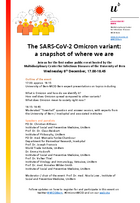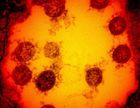COVID-19
From beginning April 2020 this website aims to collect and link the most relevant studies and guidelines in connection with COVID-19. Target audience are healthcare professionals from all specialities.
Die Zusammenstellung der Website update-coronavirus.ch richtet sich an medizinische Fachpersonen, die in kurzer Zeit einen Überblick über die wichtigsten aktuellen wissenschaftlichen Publikationen im Zusammenhang mit COVID-19 haben wollen. Die Website hat keinen Anspruch auf Vollständigkeit noch wird mit der Auflistung eine wissenschaftliche Würdigung oder Gewichtung des Inhaltes vorgenommen. Sie widerspiegelt die persönliche Einschätzung der Mitglieder der Taskforce.
Aufgrund der aktuellen Lage der Pandemie hat die Taskforce entschieden, die vorliegende Webseite vorläufig nicht mehr aktiv zu bewirtschaften. am 16. Februar 2022 (16. Feb. 22)
Due to the current situation of the pandemic, the taskforce decided to no longer actively update this website for the time being. (16th Feb. 22)
Publications and Guidelines
SARS-CoV-2 Neutralizing Antibody LY-CoV555 in Outpatients with Covid-19
Vertical transmission of coronavirus disease 2019: a systematic review and meta-analysis
Comment Knowledge-Management Taskforce Covid-19
Dieser systematische Review zeigte, dass im 3. Trimester der Schwangerschaft eine SARS-CoV-2-Infektion mit einer tiefen Rate einer vertikalen Transmission assoziiert war; ungefähr 3.2%. Diese neonatale Infektion hatte für die Säuglinge keine signifikante Konsequenz. Unklar ist jedoch, ob die vertikale Transmissionsrate mit dem Schwangerschaftsalter variiert und ob eine Transmission im 1. Trimester einen teratogenen Effekt auf den Fetus haben könnte.
Management Considerations for Pregnant Patients With COVID-19
Comment Knowledge-Management Taskforce Covid-19
Umfassende Abhandlung bezüglich der Betreuung von Schwangeren mit COVID-19-Infektion; herausgegeben von der internationalen “Society for Maternal-Fetal Medicine”
Pulmonary function and radiological features four months after COVID-19: first results from the national prospective observational Swiss COVID-19 lung study
Comment Knowledge-Management Taskforce Covid-19
113 COVID-19-Überlebende wurden in der Studie eingeschlossen (leicht/mittelschwer 47, schwer /kritisch 66). Es wurden mehrere Komorbiditäten als Risikofaktoren für einen schweren/kritischen Krankheitsverlauf identifiziert.
Immunological memory to SARS-CoV-2 assessed for up to 8 months after infection
Comment Knowledge-Mangement Taskforce Covid-19
Humorale, B- und T-Zellimmunität bleibt in der Mehrzahl der Patienten erhalten >6 Monate nach einer COVID-19 Erkrankung.
Efficacy and Safety of the mRNA-1273 SARS-CoV-2 Vaccine
Comment Knowledge-Management Taskforce Covid-19
Die Daten erhärten die hohe Kurzzeit-Immunogenität und Schutzwirkung von COVID-19 mRNA Impfstoffen mit 2 priming Dosen innert 3-4 Wochen bei guter Tolerabilität. Preliminäre Daten suggerieren zusätzlich Potential für Schutz vor asymptomatischer Infektion nach Dosis 1.
Mortality, Stroke, and Hospitalization Associated With Deferred vs Expedited Aortic Valve Replacement in Patients Referred for Symptomatic Severe Aortic Stenosis During the COVID-19 Pandemic
Comment Knowledge-Management Taskforce Covid-19
Diese Arbeit aus dem Inselspital, Universitätsspital Bern zeigt am Beispiel von Patienten mit Aortenklappenverengung auf, welche Gefahren das Verschieben von nicht-akut lebensbedrohlichen Eingriffen aufgrund der COVID-19 Pandemie mit sich bringen kann.
A Deep-Learning Diagnostic Support System for the Detection of COVID-19 Using Chest Radiographs A Multireader Validation Study
Comment Knowledge-Management Taskforce Covid-19
Forschende des Inselspitals und der Universität Bern haben ein auf Künstlicher Intelligenz basierendes System entwickelt, welches auf Lungenröntgenbildern besser zwischen «Normalbefund», «COVID-19 Pneumonie», und «Andere Pneumonie» unterscheiden konnte als Radiologen.
Postoperative Onset and Detection of SARS-CoV-2 in Surgically Resected Specimens From Gastrointestinal Cancer Patients With Pre/Asymptomatic COVID-19
Comment Taskforce Knowledge-Management Covid-19
Mittlerweise fast schon medizinhistorische Serie von chirurgischen Patienten aus Wuhan. Die Relevanz der kleinen Serie liegt in der Visualisierung von Sars-Cov2 in der Mucosa der Resektate. Verminderte Heilung von Anastomosen und eine Infektion von Chirurgen sind mögliche Folgen.
Safety and Efficacy of the BNT162b2 mRNA Covid-19 Vaccine
Comment Knowledge-Management Taskforce Covid-19
Und nun der zweite ausführliche Bericht über eine SARS-CoV-2 Impfung. Diesmal das Produkt von Pfizer/ BioNTech. Der Bericht enthält auch Resultate zur Wirksamkeit in Untergruppen (Alter, Geschlecht, Studienregion, Übergewicht), welche alle ähnlich gut aussehen. Die kurzfristigen Nebenwirkungen/Beschwerden sind ausführlich beschrieben und deutlich höher als bei der Placebo-Impfung (27% and 12%), was aber nicht erstaunt. Schwere Nebenwirkungen waren in beiden Gruppen selten (0.6% vs 0.5%).
Highlights Covid-19 Science
Links
Breaking bad news in times of Covid-19
Naming the coronavirus disease (COVID-19) and the virus that causes it
NIH Research Portfolio Covid-19
Monitoring COVID-19 spread in Switzerland (ETH)
Wichtige Info - Swissethics Covid-19
Swiss Ethics - approved research projects
Medicine Basecamp – a medical curriculum for redeployed trainees
Covid-19 AI Publication Search Covid-19 (with sign-up)








Comment Knowledge-Management Taskforce Covid-19
Diese Studie bietet erste Hinweise, dass die Gabe monoklonale Antikörper in einem frühen Stadium den Krankheitsverlauf mildern kann.